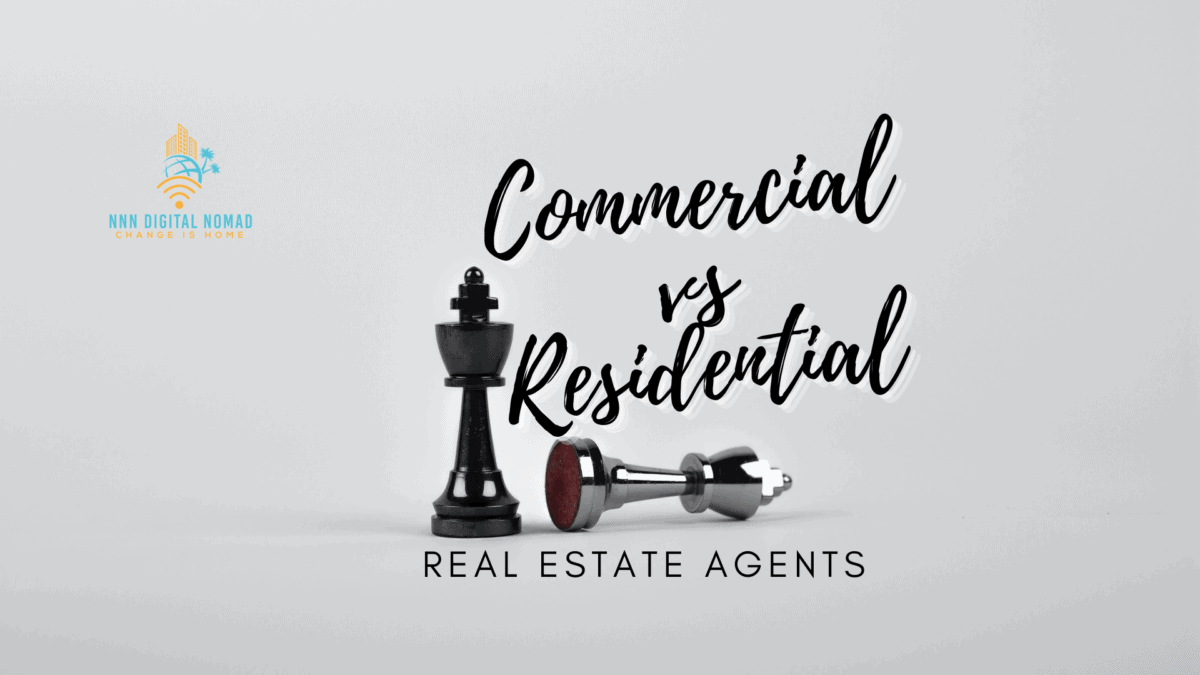When you’re trying to navigate your way through the tricky world of real estate, so many questions seem to pop-up, like what is the difference between a commercial vs. residential real estate agent?
Understanding the ins-and-outs of the real estate market takes time.
Whether you’re interested in commercial real estate, residential real estate, or learning the basic principles of the industry is important.
Knowing when you need to hire a commercial agent is critical, and determining when a residential agent will be most effective is intrinsic to your real estate playbook.
Today, I’ll be discussing the different types of real estate agents and help you determine which agent-type works best for your needs.
From selling commercial to buying residential, start your real estate journey with an agent who makes sense to your property type.
What Is the Difference Between Commercial and Residential Real Estate?
If you’re stacking up your real estate portfolio or are just getting started in the real estate game, finding a real estate agent you can trust and who will represent your needs are key ingredients to success.
Before you start interviewing for your perfect real estate agent, you’ll have to understand the vast differences between commercial and residential real estate.
If you’re new to real estate, you might think that understanding the differences between the two agent types is crystal clear; one is for personal use and one is for business. Oddly, the divide isn’t as black and white as you might think.
From residential property zoning to additional dwelling units attached to your home, the presence of commercial agents in the residential market is actually quite commonplace.
Before you commit to an agent, learn more about the main differences between the commercial and residential real estate products to better strategize your sell trades and leverage your buying power.
Commercial Real Estate
While there are always anomalies, the main rule of thumb for determining whether or not a property is considered residential all comes down to how many rental units there are.
Stand-alone family homes and any building that has fewer than five units are considered to be residential property. Anything over and above that is classified as commercial.
Commercial properties don’t have to be used for business interests such as storefronts or office space. Commercial property can include rental units, as long as they contain more than four units each.
Many investors and secondary property owners choose to invest in small real estate purchases that deal solely in residential property when they first start in the market, namely because it’s an industry that’s familiar to them.
For first-time investors, investing in commercial properties that provide residential tenancy services, such as a mixed-use property, isn’t necessarily the best tactic.
Due to the strict nature of residential tenancy laws, managing properties that serve as residences might offer a great starting-off point to learn from but are both complex and high-maintenance in nature.
Is Commercial Land More Valuable Than Residential?
If you’re wondering whether to invest your cold hard cash into commercial property or to stick to residential, it’s important to consider what sort of commercial property you might buy.
Investors tend to stick to business spaces, warehouse properties, developments, and large tracts of land. While the price tags are high, most commercial properties typically perform evenly over extended periods.
Commercial real estate ventures that don’t deal with residential tenancy are seen as more practical, time-efficient, and easier to control due to the black and white nature of the corporate world.
Consequently, commercial properties can cost you a pretty penny if they’re sitting vacant. Things like utilities and taxes can all add up quickly if your property isn’t occupied.
That’s why you have to be careful when investing in commercial real estate that’s prone to market volatility. Your investment could end up costing you big money fast if you don’t invest strategically and maintain adequate savings for unforeseen market downturns.
Watch market trends, analyze the books, and speak to other tenants or neighbors before you put in an offer to purchase.
Residential Real Estate
Residential real estate is the exact opposite of commercial real estate when it comes to defining a property by occupancy. Properties with fewer than five rental units are considered to be a residential property almost automatically.
Residential real estate investments can include the purchase of a second home or a third property condo for your child who is entering college. While these are investments, they aren’t seen as commercial entities.
Buildings like triplexes, apartment blocks, condos, and multi-unit dwellings are what separate residential real estate from commercial.
Many first-time investors like starting in the shallow end of residential real estate before making their way to the deep end of the commercial real estate pool.
While testing the waters with residential real estate investments may seem like the best strategy, residential investors can often find themselves rundown by the demands of residential real estate.
Residential real estate owners are tasked with heavy involvement in the day-to-day operations of their property and are bound by strict tenant laws that govern things like eviction and the due diligence of a landlord.
If you’re not planning on being 100% invested in your property, both physically and financially, you may want to consider holding off on your residential purchase.

The Difference Between a Commercial vs. Residential Real Estate Agent
Unless you’re in the market to buy or sell, all the billboards, business cards, busses, and friendly real estate agent commercials can all seem to blend together. You’ll likely glaze over their ads and jingles until you’re actually looking for an agent.
When you’re ready to invest, you’ll start paying a lot more attention to the real estate advertising that bombards you every day.
If you’re new to real estate, you might find yourself questioning the words beneath the agent’s pictures and struggling to comprehend exactly what those words mean.
Suddenly, words like commercial, brokerage, agency, and residential can start to seem pretty confusing.
I’ll help you break down real estate brokerage ads easily by explaining exactly what these different agent-types do.
Residential Real Estate Agents
Residential real estate agents are fully licensed, trained, and are legally responsible for overseeing the purchasing and selling of residential properties.
They typically study real estate and often apprentice with a real estate agency as they train. They must pass all of their exams with a certain average and, in many jurisdictions, must routinely enroll in continuing education courses.
Like a doctor or lawyer, residential real estate agents can lose their license for negative performance and legal issues.
Residential real estate agents only deal with properties that have up to five rental units.
Commercial Real Estate Agents
Commercial real estate agents are typically considered the more sophisticated of the two agent options.
Often having studied for years in university and obtaining a degree before beginning their real estate license, commercial real estate agents are considered to be a higher echelon of agents.
While residential agents have many challenges, commercial agents must use their knowledge of the economy and post-secondary level math to assist their commercial clients in completing their deals.
Commercial agents often have to assist with financing, market analysis, investment capital, budgeting, and long-term forecasting to get the deal closed for their clients. They have to weigh all risks and ensure a property is obtainable.
Comparatively, residential agents don’t preoccupy themselves much with the qualification of a property of the financing behind it. Instead, residential mortgage brokers are tasked with performing the majority of these duties.
Unlike residential agents who are only permitted to practice in residential real estate, commercial agents have the opportunity to sell any type of property in any market they choose within their licensing jurisdiction.
Since commercial agents have more education, background, and theoretical insight into the market, they are often more choosy with their clients and charge higher rates and commissions.
While residential real estate landlords typically work more than commercial property owners, the opposite is true of agents.
Residential real estate agents typically enjoy shorter deal timelines, while commercial agents, who are much higher in demand, are known for working extended hours and putting in large amounts of after-hours and overtime work.
Commercial agent’s work demands rival top business execs in terms of hours, client care, and availability.
What Does the Average Commercial Real Estate Agent Make?
The salary for an average commercial real estate agent can vary greatly between markets and property types.
Like residential agents, commercial agents work off commissions and their salary is never guaranteed. Their commissions have a direct correlation to the amount of property they sell as well as their size.
Those selling at the low-end of the commercial real estate spectrum may still find them earning commissions that are closer to those of a residential agent than the upper echelons of the commercial agent world.
In the United States, it is estimated that the average salary of commercial real estate agents is approximately $85,000.
While that might not seem like a lot considering the prices of properties in places like New York and L.A., on a national spectrum, where most agents do not work in top-tier metropolitan markets, that amount is quite high.
The average commission rate for a commercial agent falls anywhere between the 4% to 8% mark.
While commercial agents can negotiate their commissions, agencies and brokerages often set out specific minimums for their agents.
What Does the Average Residential Real Estate Agent Make?
Residential real estate agents typically enjoy a greater quality of life than their commercial counterparts due to their typically less restrictive work demands, but their commissions reflect this difference.
While residential real estate agents are often touted as having an easier time selling due to the constant demand of the residential market, their lower commission sizes mean having to sell far more property than commercial agents to achieve the same financial gain.
Residential agents in the United States make an average of $48,000 a year, which puts them at an earning rate that is almost 50% less than commercial agents.
Residential agent’s commission rates average between 5% and 6%. While the threshold of their commission rates is higher on the low-end of the spectrum than those of commercial agents, the value of the properties they are selling are valued at much less.

Choosing a Commercial or Residential Real Estate Advisor
If you’re buying or selling any type real estate, you’ll be able to choose between a residential or commercial agent. Since the real estate market is becoming more and more dominated by marketing rather than transactional expertise, you’ll have to carefully weigh your options.
You’ll want to find an agent who’s familiar with your market, as well as the type of property you’re dealing with. Bringing in external heavy hitters may seem like a great idea, but if they don’t know your specific market, they may not be as effective as a local agent or property type specialist.
Agents who own their markets have dynamic working relationships with other agents, which means they’ll be better able to negotiate your deal based on their mutual history of wheelings and dealings.
Whether you require a commercial or residential real estate agent, ensure they’re well versed in your property type and trade area.
What Do You Want Out of the Deal?
You might just be starting to look for real estate to buy, or are just about to get your property ready for market, which means you’ll be on the hunt for a powerful agent who will dominate your transaction.
When you’re choosing between a commercial real estate agent or a residential agent, you’ll most importantly want to examine what you want out of the deal.
When you’re looking for an agent, you’ll want to hire a natural-born closer. You can read about it in school, but you just can’t teach the art of the close. Natural-born closers have instinct, savvy, and an odd ability to stay one step ahead of the competition.
Closers aren’t unique to the commercial or residential field, and finding a street-smart agent who can close will beat out the expertise of a book-smart agent every time.
These agents work purely off reputation and volume. Whether you’re buying or selling your property, your deal will close a lot faster when your agent’s willing to have some flexibility in order to get deals across the finish line.
For those buyers and sellers who are strictly interested in commercial property, consider finding an agent who works out of a specialized brokerage or agency rather than hiring a general broker of all trades.
Specialized agents will be more likely to pay greater attention to their clients due to their expertise in a hyper niche product type or trade area.
Working With an Agent You Trust
It doesn’t matter if you choose a commercial agent or a residential one to handle your real estate needs if you don’t feel like you can trust them.
The agent-buyer or agent-seller relationship is important since so many variables come into play when you’re buying and selling property.
From the agent connecting with you constantly to the agent being privy to many private aspects of your life, your deal will always be done with greater ease when you hire an agent you have a great working relationship with.
Key factors you should take into account when seeking out an agent are:
- Their personality style: Do your personalities work together?
- Their attention to detail: Are they taking notes and remembering the things that are most important to you?
- Their focus: Do you find that they are actively listening, or does it seem like they are preoccupied with something else?
- Their reputation: It’s not everything, but it says a lot about an agent. Check out your potential agent’s online reviews and word-of-mouth feedback.
- Their drive: Look for an agent who’s passionate about getting your deal done right. Whether you’re buying or selling, find an agent that champions your cause.
Many customers can get trapped in the uncomfortable zone of being pushed around by their agent or feeling as though they don’t have a voice or choice.
Choose an agent you feel comfortable vocalizing yourself to and who, above all else, you believe will represent your needs as their own.
Finding an Agent That Works Best for Your Goals
When you’re in the process of selecting an agent, the agent type you’ll choose will likely depend on your real estate goals.
If you have multiple commercial properties with a few residential ones sprinkled in, you’ll likely stick with a commercial agent for all of your buying and selling needs.
If your portfolio is non-existent, small, or growing and is heavily rooted in residential real estate, you’ll likely opt to stick with a residential agent. Not only are they easier to come by, but they’ll help you get buying and selling faster.
Since their commission rates are lower and the fact that there are more available residential agents than commercial ones, you’ll lose less time traversing the residential agent route than if you opted for the commercial path.
At the end of the day, you must strategize your agent procurement based on your current needs, future goals, and foreseeable changes to your property ownership.
Why Using Multiple Agents Can Be a Good Idea
While it’s usually best to stick with one agent, diverse portfolios that are comprised of equal amounts of commercial and residential properties may be best served by hiring both a commercial and residential agent.
People who hold commercial real estate but also dabble in practices such as house flipping typically hire separate agents for their different market purchases.
Thanks to their availability and sheer quantity of qualified agents, residential agents are perfect for frequent residential buying and selling needs.
The frequency and volume of property you are buying and selling greatly impacts agent requirements.
If you’re constantly buying and selling multiple properties, one agent may not be enough to capitalize on your investments. Speak to your agency; they can help you determine if you may require the support services of multiple agents or assistants.
Really Committed Real Estate Agents Matter
At the end of the day, there’s no real difference between a commercial and residential real estate agent except that the commercial agent has a greater financial acumen and is skilled at negotiating large-scale property deals, and of course, there is their paycheck.
The rest of their skills are exactly the same.
From the interpersonal aspects of the client-customer relationship to the industry leaders who can close anything, the inherent personality of the real estate agent is similar in both industries.
Since real estate agents are brand builders, they’re constantly looking for new ways to both increase their reputation and their listings.
If you’re unsure about which real estate agent type to utilize, you should meet with both. Compare their commission rates, availability, reputation, and selling history.
However you choose to invest in real estate, ensure that real estate is your passion and that your passion is properly represented by your agent of choice.
FAQ
Q. Is Being a Commercial Real Estate Agent Hard?
A. That depends on your skillset. Being a commercial real estate agent typically requires a post-secondary training degree in an area such as finance. Commercial real estate agents work frequently and the job is considered high-demand.
Q. Should I Do Commercial or Residential Real Estate?
A. That all depends on how much post–secondary training you’re willing to commit to as well as what sort of lifestyle you’re seeking. Commercial real estate agents generally earn higher incomes than residential agents but also are subject to increased working hours and more demanding environments.
Q. Is Real Estate a Good Career in 2022?
A. If you love the hustle and the thrill of the deal, a career in real estate will absolutely keep you engaged and on top of your game. With unlimited earning potential and diverse national markets, real estate careers offer lucrative and rewarding opportunities for the right person.
Here is a book that I highly recommend to all real estate agents. This book is valuable to both residential and commercial real estate brokers:

Before you go, check out my list sharing the 10 Best Books for New Real Estate Agents





